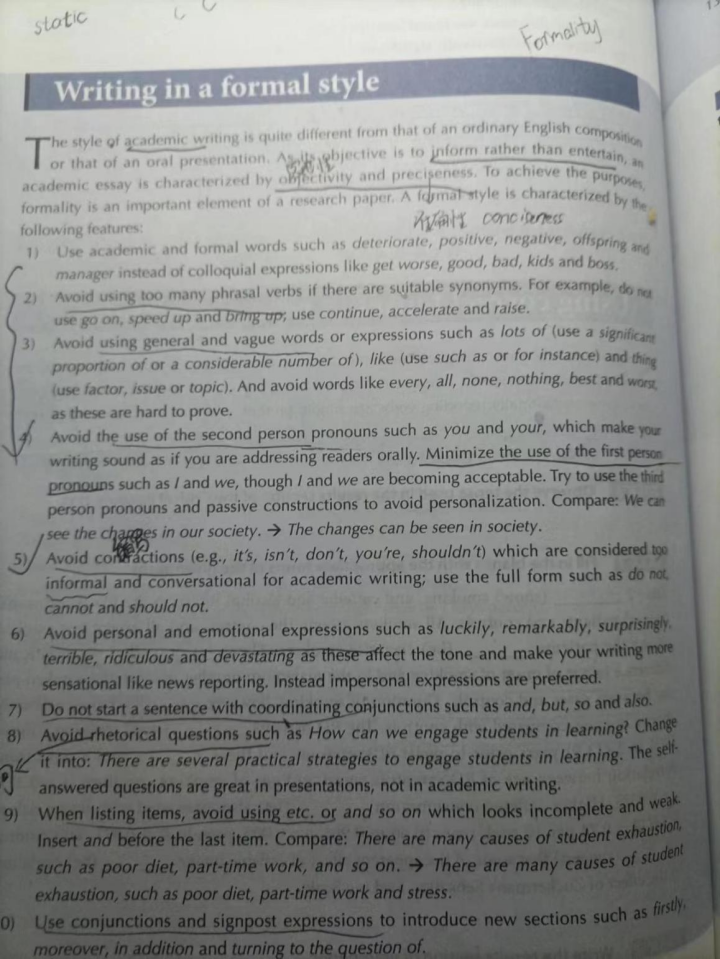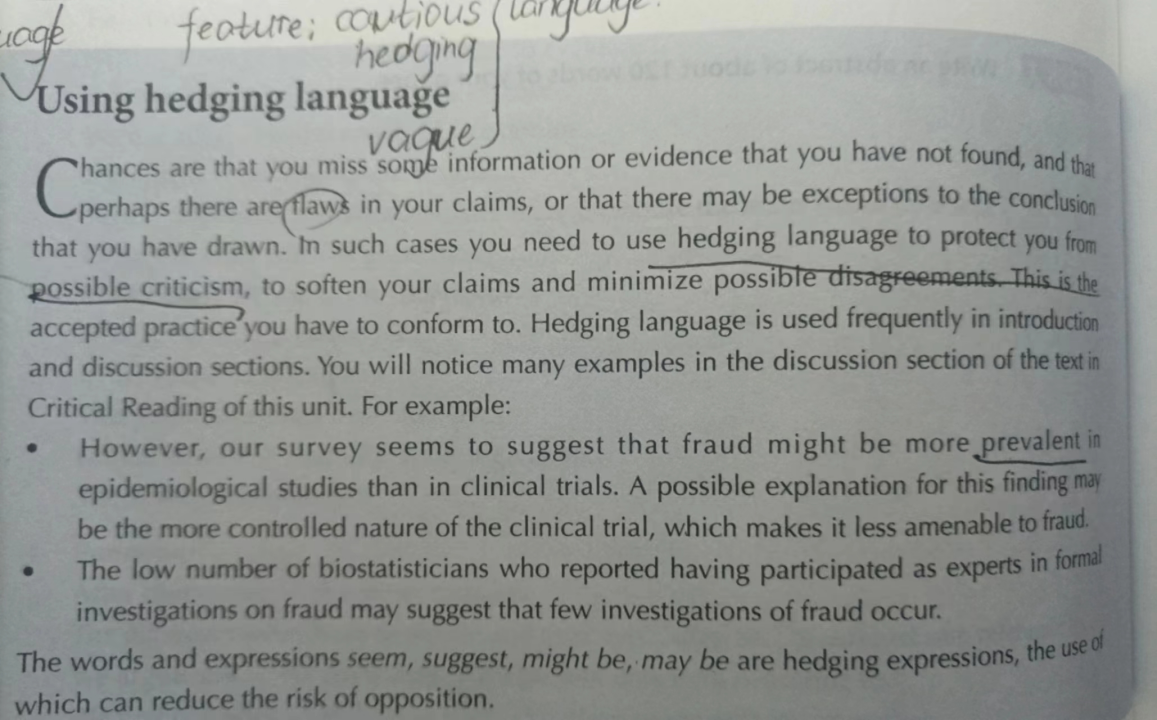目录
3.Literacy Skills--Avoiding plagiarism
4.Literacy Skills--citation and referring skills
6.Literacy Skills--summarizing
1.Academic Writing -searching for sources
2.Academic Writing -Evaluating various sources
4.Literacy Skills-Paraphrasing
1. Critical thinking-assumptions and conclusions
2.Academic Writing-Understanding a literature review
3.Academic Writing-Using appropriate tenses in literature review
4.Literacy Skills-Synthesizing
1.Academic Writing -Writing a methods section
2.Academic Writing -Writing a result section
3.Literacy Skills-Writing in a formal style P172
4.Literacy Skills-the use of passive voice
1.Academic Writing-Writing a discussion section
2.Literacy Skills-Using hedging language
UNIT 1
1.Deciding on topic --AMI
(1)Adequate
(2)Important-social and academic
(3)Manageable
拒绝too general and specialized
2.Writing a working title
Three types of key words
- method words:like study,analysis,contrast,discussion which tell the readers the research task.
- Content words:tell the reader what the topic is,such as health risk,smokers
- Limiting words:like causes,effect,advantages-limit the size of the topic
Titles tend to use phrases instead of sentences
Method words could be omitted for conciseness
Such as”a study of~~”
3.Literacy Skills--Avoiding plagiarism
Plagiarism is theft,referring the use of others’ finding ,arguments,data and words without appropriate citation or referencing a published or unpublished sources.
Word:discipline-纪律、学术、学科
4.Literacy Skills--citation and referring skills
Three citation methods
- paraphrasing :rewriting
- Quoting :copying
- Summarizing:using the important ideas
referencing skills
- in-text referencing:a brief parenthetical acknowledge .
随期刊种类不同,格式也会不同
Footnotes or end notes :humanities and social sciences
Name-year system:natural scientist
文末引用就是参考文献
P37~38
5.Literacy Skills--quoting
(1)Author-focused :quoting places emphasis on the author’s name--authority
Uses the author’s name at the beginning of the quote
(2)Information-focused:focus on the information cited
Put the reference at the end of the quote
P36
6.Literacy Skills--summarizing
Restates the main points of the original source in your own words
Two types:global specific
Some rules of summarizing
- Focus
- Paraphrasing :一行不超过四个词来自原文
- Language
UNIT2
1.Academic Writing -searching for sources
Sources :information which you take from books,journal,articles,reports,government,document,conference proceedings
Two types:
(1)primary sources/original sources:document/reports/recording
First-hand surveys,experiments
(2)secondary sources:textbooks.literature reviews
2.Academic Writing -Evaluating various sources
Three rules-- TBE
- Time Rule:the latest
- Bias(偏见) Rule: the unbiased
- Expert Rule:the authorities
3.Academic Writing -Abstract
It is composed after your research is finished and placed.
Two types:
- paper abstract
- Conference abstract
The format of abstract vary from discipline to discipline and from journal to journal,
A typical may provide:
- background of the study
- Research objectives
- Methods employed
- Important findings or results obtained
- Conclusions drawn
4.Literacy Skills-Paraphrasing
Paraphrasing:a restatement ,using your own words
When paraphrasing,need to change the words,words form and grammatical structures
*ensure*
- a sequence of three words will not be the same as the original
- Do not change the idea
- Do not add new idea
Paraphrasing and summarizing :
Paraphrasing is about the same length as the original source通过改变用法和结构
Summarizing contains its main ideas,leaving out details
UNIT3
1. Critical thinking-assumptions and conclusions
Assumptions differ from premises(前提) in that the latter are explici(显性的、明确的)t while the former are left implicit(含蓄的).
三段式
Assumptions premise conclusion
2.Academic Writing-Understanding a literature review
a literature review:a overview of the current state of research ,compare various previous studies,reveals controversies,weakness,gaps
Two types literature review
- a self-contained literature review:report the previous studies ,does not present new information,summarizes multiple previous studies
- A part of a research paper:find their weakness or limitations,is often incorporated into the introduction section.
3.Academic Writing-Using appropriate tenses in literature review
The simple past tense is often used in literature review to refer to the findings fo previous studies,
Sometimes,the present perfect tense the simple present tense is better.
4.Literacy Skills-Synthesizing

UNIT4
1.Academic Writing -Writing a methods section
1*methods section provides the technical details of how study is conducted or how data are collected to answer a research question or test a hypothesis.
The types of data collection
- by experiment
- By survey
- By interview
2*methods section severs as a”how-to”manual
Three subsection :
Participants:关键词-respondents,study,sample
materials:equipment,tool
Procedure:steps
2.Academic Writing -Writing a result section
a result section:a real meat of article
- report the data from experiment
- Highlights key findings from the data
- Round figures and make comparisons
3.Literacy Skills-Writing in a formal style P172

4.Literacy Skills-the use of passive voice
passive voice is more frequently used when
- the action and result,rather than the agent are emphasized
- First-person pronoun need to be avoided
UNIT4
1.Academic Writing-Writing a discussion section
It should
- restate the major finding
- Compare your results with previous studies
- Explain your findings
- Discuss the implications
P 203重点复习
2.Literacy Skills-Using hedging language
